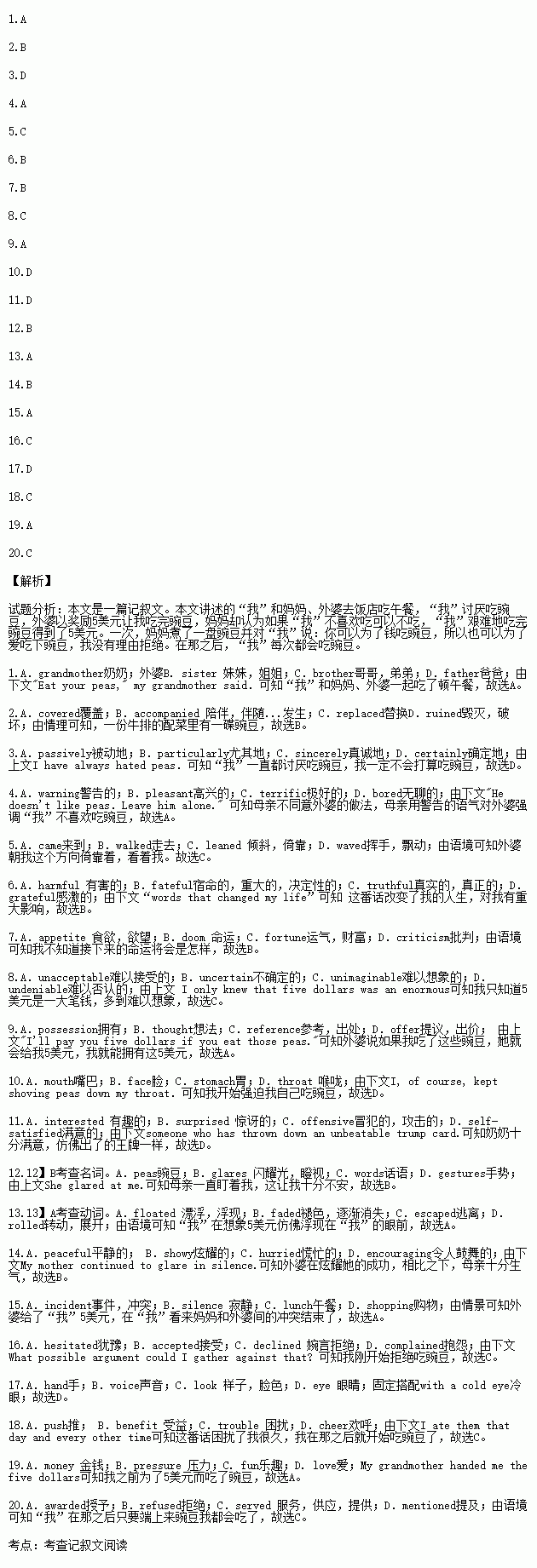题目内容
It took place at the Biltmore Hotel, which, to my eight-year-old mind, was just about the fancies place to eat.My , my mother, and I were having lunch after a morning spent shopping.I ordered a Salisbury steak.When brought to the table, it was by a plate of peas.I do not like peas now.I did not like peas then.I have always hated peas.And I was not about to eat them now."Eat your peas," my grandmother said.
"Mother," said my mother in her voice."He doesn't like peas.Leave him alone."
My grandmother did not reply.She in my direction, looked at me in the eye, and said the words that changed my life: "I'll pay you five dollars if you eat those peas."
I had absolutely no idea of the coming . I only knew that five dollars was an enormous, nearly amount of money, and as awful as peas were, only one plate of them stood between me and the of that five dollars.I began to force the terrible things down my .
My mother was very angry.My grandmother had that look of someone who has thrown down an unbeatable trump card(王牌)."I can do what I want, Ellen, and you can't stop me." My mother glared at her mother.She glared at me.
I, of course, kept shoving peas down my throat.The made me nervous, and every single pea made me want to throw up, but the magical image of that five dollars before me, and I finally swallowed down every last one of them.My grandmother handed me the five dollars in a(n) way.My mother continued to glare in silence.And the ended.Or so I thought.
My grandmother left for Aunt Lillian's a few weeks later.That night, at dinner, my mother served my favorite foods.Along with them came a big, steaming bowl of peas.She offered me some peas, and I certainly .My mother fixed me with a cold as she put a huge pile of peas onto my plate.Then came the words that were to me for years.
"You ate them for ," she said."You can eat them for love."
What possible argument could I gather against that? There was none.I ate them that day and every other time they were thereafter.
1.A.grandmother B.sister C.brother D.father
2.A.covered B.accompanied C.replaced D.ruined
3.A.passively B.particularly C.sincerely D.certainly
4.A.warning B.pleasant C.terrific D.bored
5.A.came B.walked C.leaned D.waved
6.A.harmful B.fateful C.truthful D.grateful
7.A.appetite B.doom C.fortune D.criticism
8.A.unacceptable B.uncertain C.unimaginable D.undeniable
9.A.possession B.thought C.reference D.offer
10.A.mouth B.face C.stomach D.throat
11.A.interested B.surprised C.offensive D.self-satisfied
12.A.peas B.glares C.words D.gestures
13.A.floated B.faded C.escaped D.rolled
14.A.peaceful B.showy C.hurried D.encouraging
15.A.incident B.silence C.lunch D.shopping
16.A.hesitated B.accepted C.declined D.complained
17.A.hand B.voice C.look D.eye
18.A.push B.benefit C.trouble D.cheer
19.A.money B.pressure C.fun D.love
20.A.awarded B.refused C.served D.mentioned
 阅读快车系列答案
阅读快车系列答案根据对话内容,从对话前的选项中选出能填入空白处的最佳选项,并在答题卡上将该项涂黑。选项中有一项为多余选项。如果选项为E,则涂A和B两项; 如果选项为F,则涂A和C两项。
A.When did it come out? B.How many times have you read it? C.Is it far from here? D.Who is your favorite author? E.It is wonderful. F.So do I. |
A:Hi,Bill! You’re reading the novel again.
B:Yes, Tom. I ’ll never be tired of it.
A: 1.
B: Three times.Every time I read it,I can learn something new.
A: Really? 2.
B: Charles Dickens.I think he is a great English writer.What about you?
A: 3. He is also my favorite foreign writer.Please let me have a look at it.
B:OK, here you are! What do you think of this novel?
A: 4. I haven’t seen a better one for long.Where did you buy it?
B: In the Rose Bookshop.
A:I don’t know where it is. 5.
B: No.Only 10 minutes’ walk from here,next to the People’s Cinema.
A:Oh, I see.I'm going there to get one,too.Thank you!
B:You’re welcome.

